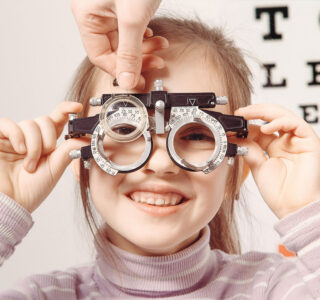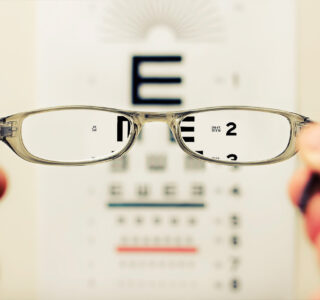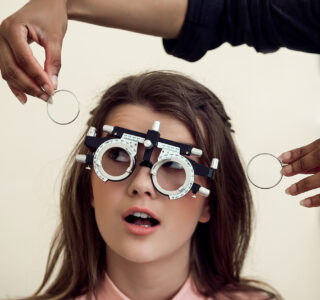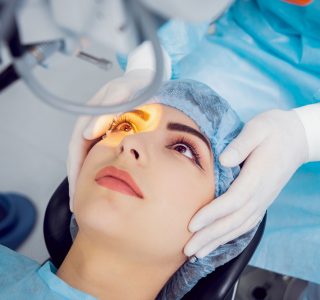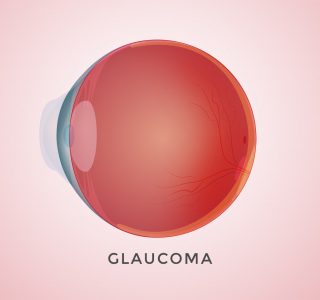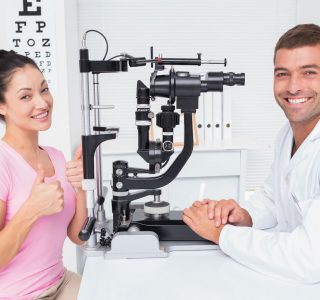Advanced Lens Implants: Cataract Surgery for the 21st Century
As we grow older, our vision goes through a series of changes. These changes usually begin in our early 40s and continue throughout life. The two most common changes in vision that are a direct result of aging are: 1) Presbyopia and 2) Cataracts.
What is a Cataract?
Cataracts affect almost everyone, sooner or later. The natural lens of the eye is made mostly of water and protein. It is crystal clear and located behind the pupil of the eye. The lens is responsible for focusing light rays onto the center of the retina, known as the macula. As you age into your 60s and higher, some of the protein in the lens will clump together, causing the natural lens to become discolored and clouded. When this occurs, light rays passing through the eye become scattered and unfocused. The result is that all objects, whether near or far, become blurry. Other patients can experience light sensitivity, glare, haloes, and worsening of their prescription eyeglasses as the cataracts develop. The clouding of the natural lens is called a cataract. If left untreated, cataracts can lead to blindness, although this is very uncommon in the U.S.
Most cataracts develop as part of the aging process, but may be present at birth (congenital) or result from an injury, systemic disease (diabetes), or steroid use. Using specialized equipment, cataracts as well as other eye diseases are diagnosed during a complete eye examination by your ophthalmologists at The Virdi Eye Clinic & Laser Vision Center. The mere presence of a cataract does not indicate the need for surgery. Some cataracts may be slow growing, and stronger glasses may correct vision for a period of time. Some cataracts develop more rapidly than others, and your eye doctor can monitor changes in vision and cataracts with periodic eye examinations
The only treatment for a visually significant cataract is removal of the affected natural lens of the eye and implantation of an intraocular lens (IOL). This restores the eye’s ability to have light pass unobstructed through the pupil and on to the retina.
What is Presbyopia?
As we age, the natural lens in our eye becomes less flexible. This lack of flexibility compromises the eye’s ability to switch from far vision to near vision and vice versa. The practical effect of this loss of flexibility in the natural lens of the eye is that we lose our ability to read or see close objects without reading glasses or bifocals. This is called presbyopia.
Cataract surgery for the 21st century:
Over 14 million cataract surgeries are performed worldwide for cataracts that are visually significant. At the Virdi Eye Clinic and Laser Vision Center, our surgeons offer the most advanced options to remove cataracts by a laser-assisted procedure along with ultrasound phacoemulsification surgery. This is a no-shot, no-stitch, no-needle, no-patch surgery that takes on average 10 to 15 minutes to do. After making a tiny incision measuring 2.5 mm in the cornea, which is the clear window of the eye, the surgeon introduces an ultrasound probe which dissolves the cataract and vacuums it out of the eye. A clear protective covering or capsule of the cataract is left behind so that a lens implant can be placed in this capsular bag. The capsule then shrink wraps around the lens implant and stabilizes it without any stitches being placed. Your ophthalmologist will discuss which technique – the laser-assisted or traditional ultrasound options -will be appropriate for you as well as the advanced lens options discussed below.
The 13 million Americans who have cataracts now have access to Multifocal lens implants that offer patients a range of vision from near to far, and may make glasses unnecessary for most everyday activities. Until recently, patients undergoing cataract surgery received the standard insurance-issued monofocal or single focus lens implant. These lenses when implanted in both eyes generally provided excellent distance vision while patients often needed spectacle correction for near and intermediate vision. The new generation of advanced lens implants including multifocal and astigmatism-correcting toric lenses, ensure that ophthalmologists are now able to dramatically reduce the need for bifocals or trifocal glasses after surgery. Clinical studies show that up to 95% of those receiving multifocal lens implants “never” or “only occasionally” need to wear glasses after cataract surgery. The multifocal lens implants come in a variety of powers for distance and near and are popularly known as Restor and Tecnis multifocal lens implants. Today’s fourth-generation multifocal lens implant can provide cataract patients with a full range of vision and greater independence from glasses or contact lenses than ever before.
If you suffer from poor vision or think you might have a cataract, you should make an appointment to have a complete eye examination. Once our doctors at the Virdi Eye Clinic and Laser Vision Center determine that you are a good candidate for the multifocal or astigmatism-correcting toric intraocular lens, you will be given additional information about the possible risks, complications, and costs involved with the procedure..
